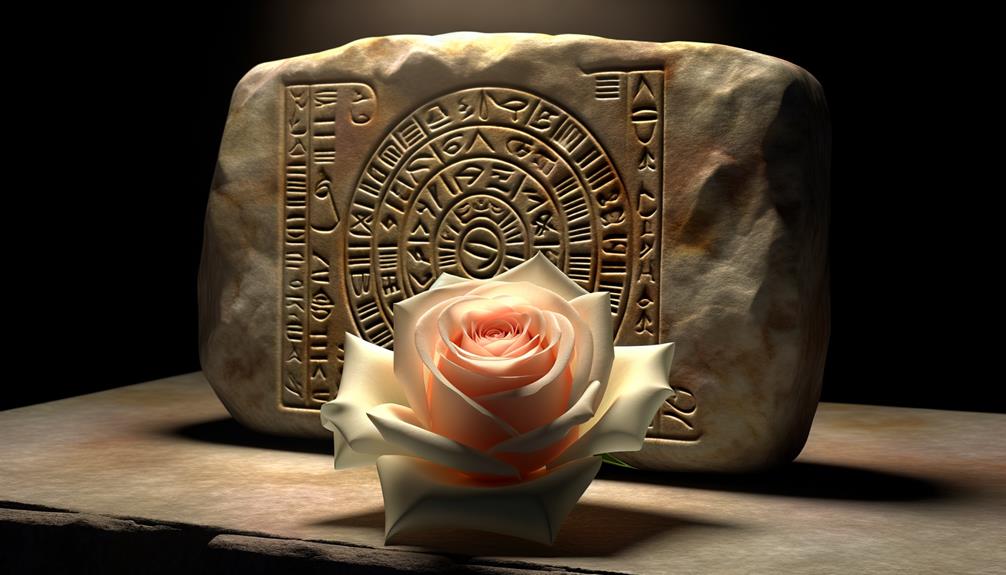Meaning of the Name Rosetta
The name Rosetta, rooted in the Italian word 'rosa' meaning 'rose,' carries profound cultural and linguistic significance. This diminutive form not only suggests beauty and endearment but also mirrors the rich Italian and Latin traditions.
Historically, the Rosetta Stone, discovered in Egypt in 1799, further elevates the name's prestige by being pivotal in revealing ancient Egyptian hieroglyphs. Symbolically, Rosetta represents enlightenment, discovery, and interconnectedness.
Its enduring appeal is evident in varied literary and modern cultural references. To uncover more about its historical evolution and symbolic richness, one must consider the broader context in which this name has thrived.

Key Takeaways
- The name Rosetta is derived from the Italian word 'rosa,' meaning 'rose.'
- It signifies beauty and has cultural and botanical significance.
- Rosetta is a diminutive form, often used to convey endearment and admiration.
- The name symbolizes enlightenment, discovery, and interconnectedness.
- It reflects a rich linguistic history influenced by Latin, Italian, and Indo-European languages.
Origins of the Name
The name Rosetta has its origins in the Italian language, derived from the word 'rosa,' meaning 'rose.' Historically, the name reflects a rich tapestry of cultural and botanical significance.
During the Renaissance, Italy was a nexus of art and literature, with the rose symbolizing beauty and complexity, attributes that were highly esteemed. The diminutive form 'Rosetta' suggests endearment, often used to convey affection and admiration.
Over time, the name transcended its geographical origins, becoming popular in various European countries. The adoption of Rosetta in different cultures also underscores the historical movement of people and ideas, illustrating how names can encapsulate both personal and collective heritage.
This historical context enriches our understanding of the name's enduring appeal.
Etymology and Linguistic Roots
In examining the etymology and linguistic roots of Rosetta, one finds a rich confluence of Latin, Italian, and broader Indo-European influences that shape the name's intricate evolution.
The name Rosetta derives from the Latin word ‘rosa,’ meaning ‘rose,’ reflecting its symbolic association with the flower. This Latin root evolved into the Italian diminutive ‘Rosetta,’ which translates to ‘little rose. ‘ The Italian suffix ‘-etta’ conveys endearment and smallness, emphasizing the name’s affectionate connotations. In addition to its linguistic roots, the name Rosetta also carries historical significance, as it was the name given to the Rosetta Stone, a key artifact in deciphering ancient Egyptian hieroglyphs. Similarly, the meaning and origin of the name Raj can be traced back to its Sanskrit roots, where it signifies kingship or royalty, reflecting its regal connotations. The name Raj has been used in various cultures across Asia, from India to Malaysia, and continues to carry associations of power and authority.
The Indo-European roots trace back to the ancient term for the rose, signifying beauty and love, embedding these cultural values within the name. This multifaceted linguistic journey underscores Rosetta's enduring charm and historical resonance across various languages and cultures.
The Rosetta Stone
Among the most significant archaeological discoveries, the Rosetta Stone serves as a critical key to understanding ancient Egyptian civilization and language. Discovered in 1799 by French soldiers in the town of Rosetta, the stone features a decree issued in 196 BCE during the Ptolemaic dynasty. The text is inscribed in three scripts: Greek, Demotic, and Hieroglyphic. This trilingual inscription enabled scholars, most notably Jean-François Champollion, to decipher Egyptian hieroglyphs, thereby accessing vast troves of historical and cultural knowledge.
| Element | Description |
|---|---|
| Discovery Year | 1799 |
| Location Found | Rosetta (Rashid), Egypt |
| Inscription Languages | Greek, Demotic, Hieroglyphic |
| Deciphered By | Jean-François Champollion |
The Rosetta Stone represents a monumental breakthrough in Egyptology and linguistic studies.
Historical Significance
Beyond its role as a linguistic key, the Rosetta Stone's discovery profoundly influenced the trajectory of historical scholarship and the understanding of ancient civilizations. Unearthed in 1799 by French soldiers during the Napoleonic campaign in Egypt, the artifact became a cornerstone for Egyptology.
Its trilingual inscriptions—hieroglyphic, demotic, and Greek—enabled scholars, most notably Jean-François Champollion, to decode Egyptian hieroglyphs, thereby revealing millennia of previously inaccessible historical and cultural knowledge. This breakthrough facilitated a thorough study of ancient Egyptian texts, art, and society, shedding light on their intricate civilization.
The Stone's historical significance extends beyond Egyptology, as it symbolized the power of interdisciplinary research, combining linguistics, archaeology, and history to expose the past's richness.
Rosetta in Literature
The name Rosetta has permeated literary works, often imbued with rich symbolism and intricate characterizations.
In classic novels, Rosetta frequently symbolizes enlightenment and deciphering hidden truths, akin to the Rosetta Stone's historical role in understanding Egyptian hieroglyphs.
Additionally, authors have employed the name Rosetta for characters who embody these themes, further enriching the narrative with layers of historical and cultural resonance.
Symbolism in Classic Novels
In examining the symbolism of the name Rosetta within classic literature, one reveals layers of meaning that often intertwine historical context with profound narrative significance. The name 'Rosetta' evokes the Rosetta Stone, a pivotal artifact in deciphering Egyptian hieroglyphs, symbolizing revelation, discovery, and the revealing of secrets. When employed in literary works, it often serves as a metaphor for understanding intricate truths or discovering hidden knowledge. Furthermore, the etymology of Rosetta, meaning 'little rose' in Italian, adds a delicate nuance, intertwining themes of beauty, fragility, and growth.
| Symbolism | Interpretation |
|---|---|
| Rosetta Stone | Decoding, discovery, enlightenment |
| Little Rose | Beauty, fragility, growth |
| Historical Context | Unveiling complex truths |
This intricate symbolism enriches the narrative layers of classic novels.
Rosetta as Character Name
Often employed as a character name, Rosetta conveys multifaceted layers of meaning that enrich the narrative and thematic complexity within literary works.
Historically, the name Rosetta has been associated with mystery and revelation, stemming from the Rosetta Stone, which opened the secrets of ancient Egyptian hieroglyphs. This association endows characters named Rosetta with an aura of discovery and insight.
Additionally, the name carries connotations of beauty and elegance, derived from its similarity to 'rose.'
- Symbol of Decipherment: Characters named Rosetta often symbolize the unraveling of complex mysteries or truths.
- Cultural Resonance: The name's historical significance can imbue a narrative with rich, cultural layers.
- Elegance and Grace: Its phonetic and visual likeness to 'rose' suggests inherent beauty and sophistication.
Modern Cultural References
Given its historical significance, the name Rosetta has permeated various aspects of modern culture, manifesting in areas such as technology, literature, and entertainment.
In technology, the Apple Rosetta software facilitated the shift from PowerPC to Intel processors, signifying a bridge between different computational languages, much like the Rosetta Stone did for ancient scripts.
In literature, the name Rosetta appears in various novels as a symbol of deciphering complex mysteries.
In entertainment, the European Space Agency named its 2004 comet mission 'Rosetta,' underscoring the quest for knowledge and understanding.
These references highlight the enduring legacy of the name, linking it to themes of translation, discovery, and innovation across diverse contemporary contexts.
Popularity Over Time
The name Rosetta has experienced significant fluctuations in popularity over the centuries, often influenced by historical events and cultural shifts. This is evident in its prevalence changing geographically, with particular spikes in regions linked to prominent historical or linguistic developments.
Moreover, specific influential moments in pop culture have sparked renewed interest in the name, further shaping its historical trajectory.
Historical Popularity Trends
Tracing the historical popularity of the name Rosetta reveals a fascinating evolution influenced by cultural, literary, and historical milestones.
Its initial surge in the late 19th and early 20th centuries coincided with a broader trend of floral and nature-inspired names. The name experienced a renaissance following the discovery of the Rosetta Stone in 1799, which notably boosted its cultural cachet.
Additionally, Rosetta has been immortalized in various artistic forms, further embedding it in public consciousness.
- 19th Century: Rise in floral names, including Rosetta.
- Early 20th Century: Popularity bolstered by the Rosetta Stone's historical significance.
- Mid-20th Century: Continued presence in literature and music, sustaining its relevance.
Such influences have collectively shaped the name's enduring appeal.
Geographic Popularity Variations
Regional differences in the popularity of the name Rosetta reveal intricate patterns shaped by cultural, historical, and socio-economic factors unique to each area.
In Italy, for instance, Rosetta enjoyed a peak during the early 20th century, reflecting the nation's rich linguistic heritage.
Meanwhile, in the United States, the name saw a surge during the 1920s and 1930s, likely influenced by immigration and the blending of Italian-American communities.
It is worth noting that in Britain, Rosetta's popularity spiked in the mid-19th century, coinciding with the discovery of the Rosetta Stone, which ignited public fascination.
These variations underscore how local events and cultural shifts play a significant role in influencing naming trends, revealing a complex tapestry of social dynamics across different regions.
Influential Pop Culture Moments
Throughout history, significant moments in pop culture have profoundly impacted the popularity of the name Rosetta, reflecting larger societal trends and cultural shifts. The name surged in recognition due to various influential events and figures.
- Rosetta Tharpe: The pioneering gospel singer and guitarist, whose groundbreaking fusion of spiritual music and rhythm and blues in the 1940s, heralded the name into the spotlight.
- Rosetta Stone: The discovery of the Rosetta Stone in 1799 profoundly influenced historical linguistics, embedding the name in academic and cultural consciousness.
- Rosetta Spacecraft: The European Space Agency's mission to study comet 67P/Churyumov–Gerasimenko in the 2010s revived interest in the name, symbolizing human ingenuity and exploration.
These moments illustrate the dynamic interplay between culture and nomenclature.
Symbolic Meanings
Emerging from a historical context rich in linguistic and cultural implications, the name Rosetta carries profound symbolic meanings that are deeply intertwined with its etymological roots and the ancient artifact, the Rosetta Stone. The Rosetta Stone, discovered in 1799, was pivotal in deciphering Egyptian hieroglyphs, symbolizing the opening of ancient mysteries and communication barriers. Similarly, the name Rosetta signifies enlightenment, exploration, and interconnectedness.
| Symbolism | Historical Context | Cultural Significance |
|---|---|---|
| Enlightenment | Deciphering scripts | Academic breakthroughs |
| Discovery | Archaeological finds | Intellectual curiosity |
| Interconnectedness | Multilingual text | Cross-cultural dialogue |
This multifaceted symbolism enriches the name Rosetta, imbuing it with a legacy of intellectual achievement and cultural unity.
Conclusion
In tracing the name Rosetta through the labyrinth of history, language, and culture, a vivid tapestry emerges. The name evokes the ancient Rosetta Stone, a cornerstone in the understanding of human communication.
It unfurls its petals in literature and modern culture, while its popularity ebbs and flows like the tides. Symbolically rich, Rosetta stands as a beacon of enlightenment and discovery, its enduring legacy etched into the annals of time.






